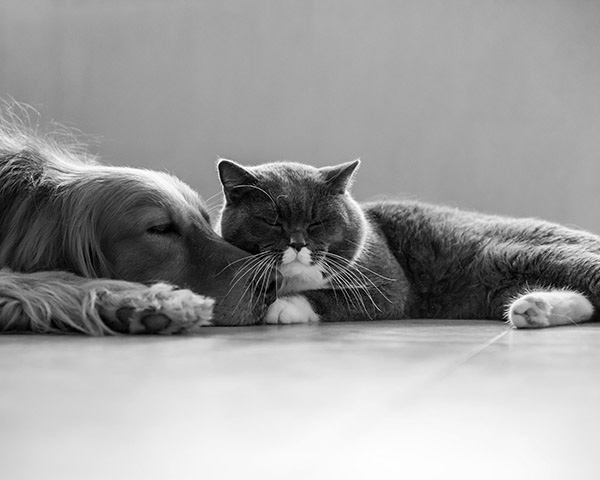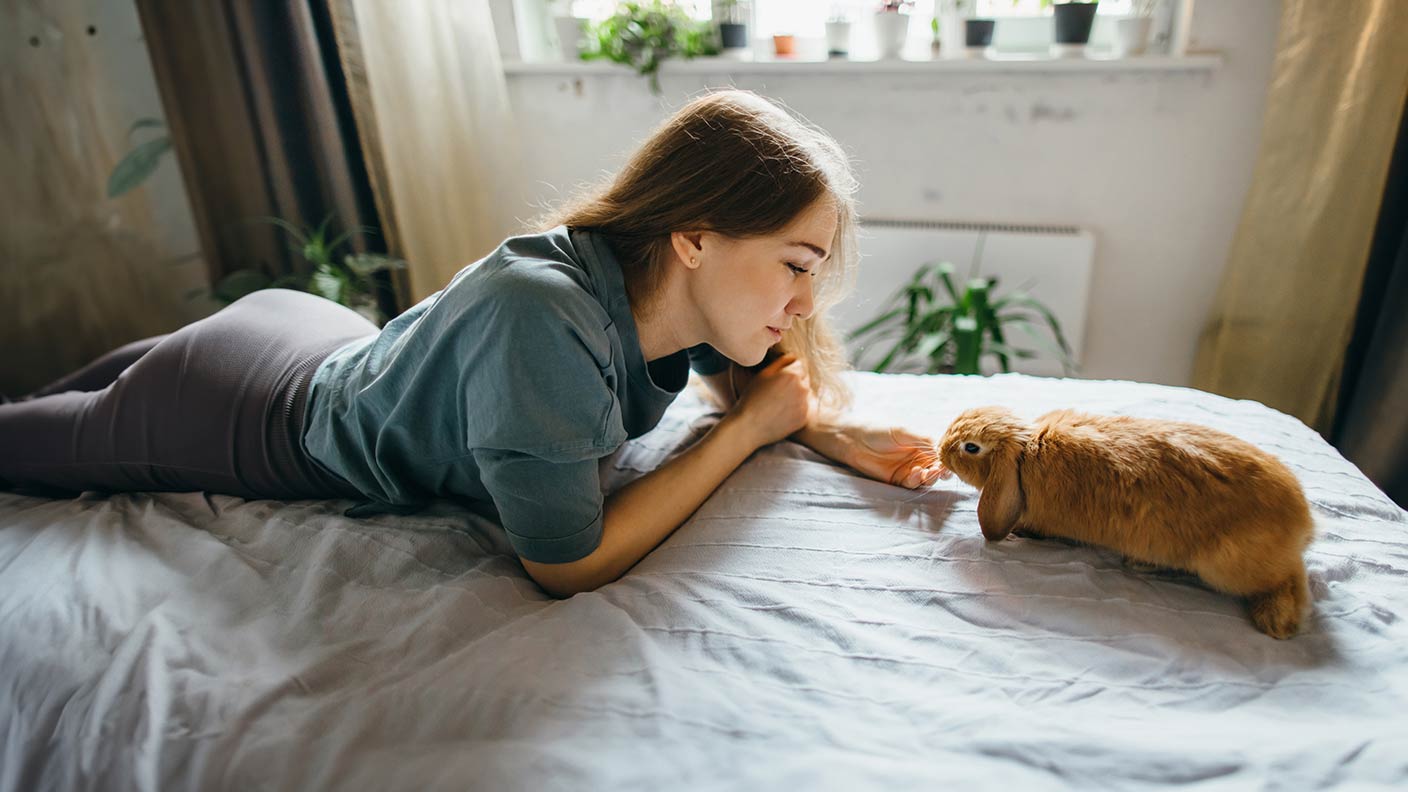How to tell if a rabbit is pregnant
Rabbits are a social species that thrive with a companion. With rabbits reaching puberty between three to nine months old depending on size, and rabbit pregnancy only lasting around a month, it’s quite clear where the phrase ‘breeding like rabbits’ comes from.
It can be hard to spot signs of a pregnant rabbit right away. Increased appetite and weight gain are common indicators, but you often can’t rely on physical symptoms alone.
Instead, you can expect the following rabbit pregnancy signs:
- Aggressive behaviour: One of the earliest signs of rabbit pregnancy is their defensive and territorial behaviour. She may display mood swings and not want to be held.
- Fur pulling: Pregnant rabbits pluck fur from their sides, abdomen and dewlap (area under the chin) to build a nest. Pulled fur also serves as a blanket to keep their babies warm.
- Nest building: Soon-to-be mothers will instinctively build a rabbit nest using hay or straw along with their own fur in preparation for giving birth.
Your rabbit may experience false pregnancy, also known as rabbit phantom pregnancy or pseudopregnancy. This is when the female bunny displays signs of pregnancy despite not being pregnant. False pregnancy can last for 16-18 days , after which the female bunny returns to normal.
How long are rabbits pregnant for?
The rabbit gestation period isn’t long at all. Rabbits reproduce quickly, with pregnancies typically lasting around 31-33 days . As if that isn’t impressive enough, rabbits can produce a litter of up to 14 kits (baby rabbits).
Such a short gestation period means rabbits can become pregnant again within hours of giving birth. Kits are born blind, deaf and hairless, but will begin to develop features after about 10 days.
While your rabbit is pregnant, make sure she has plenty of bedding material, a clean enclosure and constant access to clean, fresh water.
Pregnant rabbit labour signs
Before a rabbit gives birth, known as kindling, she will likely spend most of the time hiding away in her nest. She may dig a burrow for privacy in preparation for giving birth.
Kindling usually happens early in the morning, when the mother-to-be feels safest, and typically lasts around 30 minutes.
Rabbits may show their face and move around between kits if she is having difficulty kindling, but obstruction is rare.
How to care for a rabbit in labour
Once a rabbit gives birth, it’s important to give her time alone with her kits. She will lick and clean her young and eat the placentas as they pass. Kits normally nurse from their mother the night after the birth.
Avoid disturbing the mother for at least day after her giving birth. Frightened rabbits may harm their kits or stop feeding them.
Caring for baby rabbits
After kits are born, the mother rabbit may display behaviours that might seem odd at first. What’s most important that you leave the mum to do her job. But you can also help to keep her loveable kits happy and healthy.
Normal behaviour
If your female rabbit stays away from her litter after birth, don’t panic. Mother rabbits leave their young to avoid drawing the attention of predators. This is normal behaviour, and not doing so can be very distressing for the mother and her kits.
It’s important that she has her own space in the enclosure to retreat to. Female rabbits will return to the nest to feed the litter a few times a day, before leaving again for long periods of time.
Handling baby rabbits
It might be tempting to stroke your rabbit’s babies, but avoid handling them until they are at least ten days old. Sometimes infant rabbits may leave their nest, in which case you should stroke the mother rabbit before gently putting them back. This will transfer her scent onto your hands before you touch the kits, reducing the chances of a kit being rejected.
Gentle handling of baby rabbits is extremely important. Interact positively with them for a few minutes a day to socialise them. Once they’re about three weeks old, provide them with plenty of space to explore, exercise and play.
Diet for baby rabbits
Good quality hay is crucial for a rabbit’s diet. Baby rabbits practice eating hay from about two weeks old, along with their mum’s milk. Once they start leaving the nest from three weeks old, you can slowly introduce fresh veg.
At five to six weeks old, kits can eat a mix of fresh daily greens. Once they’re around eight weeks old, they will be fully weaned. Always provide fresh water in a shallow bowl . If they have a lack of appetite or facial swelling, it might be worth checking their teeth.
How to prevent unwanted rabbit pregnancies
If you want to avoid a surprise litter, there are two things you can do.
Keep males and females separate
If your rabbit has already given birth, it’s a good idea to identify the kits’ gender. Siblings will mate with each other if given the chance, and it will only be a few weeks’ time before they are able to breed.
If you can’t verify their gender, your vet can assist you . After that, keep them separated in different areas of the enclosure. If you can, pair them by gender to make sure they’re not left alone.
Have your rabbit neutered
It’s worth speaking to your vet about getting your rabbits neutered. Neutering has countless benefits for rabbits, including:
- Preventing life-threatening health issues such as cancer.
- Giving rabbits a fulfilled life with a companion.
- Reducing aggression and fighting between siblings.
A neutered male and neutered female pair bond works best for pet rabbits, as they aren’t frustrated by hormones produced by one another. Female rabbits can be neutered from four months while males can be neutered from ten weeks.
Sainsbury's Bank Rabbit Insurance
Keep your rabbit hopping and happy with rabbit insurance. We can help cover the cost of expenses for vet visits, health conditions and more, so you can care for your pregnant rabbit and her little thumpers for their lifetime.
Please note that we won't cover any pre-existing conditions and that terms, conditions, excesses, exclusions and limitations apply.
Frequently asked questions
How many baby rabbits in a litter?
Rabbits have an average litter size of five to eight kits . They can have as little as one kit and as many as 14 kits at any one time.
How long is rabbit pregnancy?
The rabbit gestation period is very short, with pregnancy lasting around one month (31-33 days).
How long after birth can a rabbit get pregnant again?
Female rabbits can become pregnant again within 24 hours of giving birth. Since they reproduce quickly, a female rabbit can produce around 30 young in a single breeding season.

Browse our guides
Choose from our list of helpful guides and information

Explore dog breeds
Find out how to keep your dog healthy and happy

Cat breed guides
How to care for your cat, common health problems and more
Terms and conditions
Important Information
* The discount is based on information related to you and the Sainsbury’s and Sainsbury’s Bank transactions linked to your Nectar account. For more information on how we use your data, go to sainsburysbank.co.uk/privacy
Sainsbury's Bank plc, Registered Office, 33 Charterhouse Street, London, EC1M 6HA (registered in England and Wales, no 3279730) is authorised by the Prudential Regulation Authority and regulated by the Financial Conduct Authority and the Prudential Regulation Authority (register no. 184514).
Sainsbury's Supermarkets Ltd is an appointed representative of Sainsbury's Bank plc. Sainsbury's Bank plc acts as an introducer to Pinnacle Insurance Ltd who is authorised by the Prudential Regulation Authority and regulated by the Financial Conduct Authority and the Prudential Regulation Authority (register number 110866). Registered office: 4th Floor, Limelight, Elstree Way, Borehamwood, Hertfordshire, WD6 1JH. Sainsbury’s Bank Pet Insurance is arranged, administered and underwritten by Pinnacle Insurance Ltd. Sainsbury's Bank plc and Pinnacle Insurance Ltd are not part of the same corporate group.
We do not provide personal recommendations to customers.
